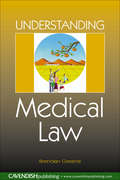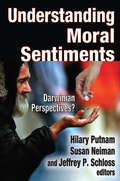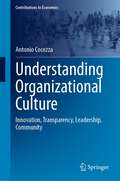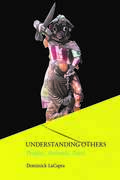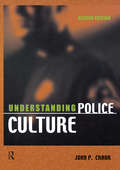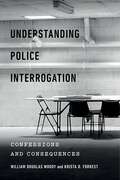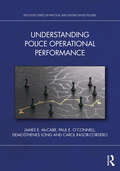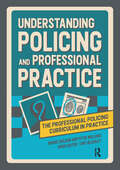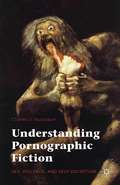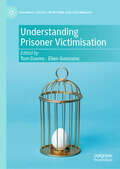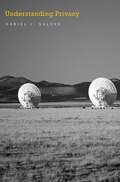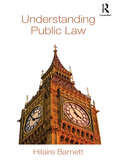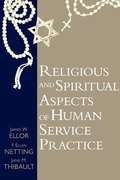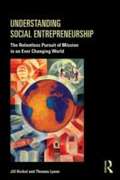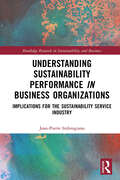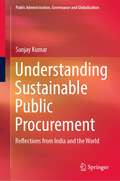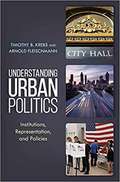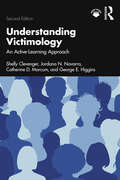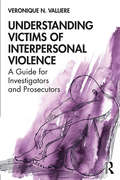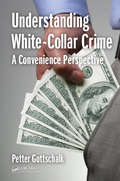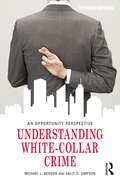- Table View
- List View
Understanding Medical Law
by Brendan GreeneThis book gives the reader a flavour of the main issues arising in medical law, including the problems of consent to treatment, medical negligence, abortion and whether euthanasia should be legalized.
Understanding Moral Obligation
by Robert SternIn many histories of modern ethics, Kant is supposed to have ushered in an anti-realist or constructivist turn by holding that unless we ourselves 'author' or lay down moral norms and values for ourselves, our autonomy as agents will be threatened. In this book, Robert Stern challenges the cogency of this 'argument from autonomy', and claims that Kant never subscribed to it. Rather, it is not value realism but the apparent obligatoriness of morality that really poses a challenge to our autonomy: how can this be accounted for without taking away our freedom? The debate the book focuses on therefore concerns whether this obligatoriness should be located in ourselves (Kant), in others (Hegel) or in God (Kierkegaard). Stern traces the historical dialectic that drove the development of these respective theories, and clearly and sympathetically considers their merits and disadvantages; he concludes by arguing that the choice between them remains open.
Understanding Moral Sentiments: Darwinian Perspectives?
by Hilary PutnamThis volume brings together leading scholars to examine Darwinian perspectives on morality from widely ranging disciplines: evolutionary biology, anthropology, psychology, philosophy, and theology. They bring not only varied expertise, but also contrasting judgments about which, and to what extent, differing evolutionary accounts explain morality. They also consider the implications of these explanations for a range of religious and non-religious moral traditions.The book first surveys scientific understandings of morality. Chapters by Joan Silk and Christopher Boehm ask what primatology and anthropology tell us about moral origins. Daniel Batson and Stephen Pinker provide contrasting accounts of how evolution shapes moral psychology, and Jeffrey Schloss assesses a range of biological proposals for morality and altruism. Turning to philosophical issues, Martha Nussbaum argues that recognizing our animal nature does not threaten morality. Stephen Pope and Timothy Jackson explore how Darwinian accounts of moral goodness both enrich and require understandings outside the sciences. Hilary Putnam and Susan Neiman ask whether Darwin is truly useful for helping us to understand what morality actually is and how it functions.The book is a balanced effort to assess the scientific merits and philosophical significance of emerging Darwinian perspectives on morality.
Understanding Organizational Culture: Innovation, Transparency, Leadership, Community (Contributions to Economics)
by Antonio CocozzaTaking a multidimensional approach, this book sheds light on the evolution of organizational studies in a structured and systematic way, against the background of economic and social changes in recent decades. By doing so, the book focuses on the plurality of organizing models as a central concept. This plurality is important to the survival of the firm in response to the growing complexity of the economic, social, and technological innovation that has arisen as a result of globalization. The book goes beyond the traditional approach to the study of organizations, of a structural and functionalistic type. It investigates the role of cultures and the ethical, symbolic, and value dimensions in the redefinition dynamics of strategic assets, as well as the search for new governance models in innovative organizations. Further, it discusses the role of leadership, in relation to the development of professional groups and the skills necessary for the management of endo-organizational, inter-organizational, and trade union negotiation processes. Finally, the book analyzes the economic, social, and cultural change in societies and discusses how companies and organizations of all types can develop cultures of innovation that may lead to socially inclusive governance.This book will appeal to students, researchers, and scholars of economics, business, and the social sciences, as well as professionals and practitioners interested in a better understanding of how organizations function in today’s globalized world.
Understanding Others: Peoples, Animals, Pasts
by Dominick LaCapraTo what extent do we and can we understand others—other peoples, species, times, and places? What is the role of others within ourselves, epitomized in the notion of unconscious forces? Can we come to terms with our internalized others in ways that foster mutual understanding and counteract the tendency to scapegoat, project, victimize, and indulge in prejudicial and narcissistic impulses? How do various fields or disciplines address or avoid such questions? And have these questions become particularly pressing and not in the least confined to other peoples, times, and places? Making selective and critical use of the thought of such important figures as Sigmund Freud, Jacques Derrida, and Mikhail Bakhtin, in Understanding Others Dominick LaCapra investigates a series of crucial topics from the current state of deconstruction, trauma studies, and the humanities to newer fields such as animal studies and posthumanist scholarship. LaCapra adroitly brings critical historical thought into a provocative engagement with politics and our current political climate. This is LaCapra at his best, critically rethinking major currents and exploring the old and the new in combination, often suggesting what this means in the age of Trump.
Understanding Police Culture
by John P. CrankPolice culture has been widely criticized as a source of resistance to change and reform, and is often misunderstood. This book seeks to capture the heart of police culture--including its tragedies and celebrations--and to understand its powerful themes of morality, solidarity, and common sense, by systematically integrating a broad literature on police culture into middle-range theory, and developing original perspectives about many aspects of police work.
Understanding Police Interrogation: Confessions and Consequences (Psychology and Crime #4)
by William Douglas Woody Krista D. ForrestUses techniques from psychological science and legal theory to explore police interrogation in the United States Understanding Police Interrogation provides a single comprehensive source for understanding issues relating to police interrogation and confession. It sheds light on the range of factors that may influence the outcome of the interrogation of a suspect, which ones make it more likely that a person will confess, and which may also inadvertently lead to false confessions. There is a significant psychological component to police interrogations, as interrogators may try to build rapport with the suspect, or trick them into thinking there is evidence against them that does not exist. Also important is the extent to which the interrogator is convinced of the suspect’s guilt, a factor that has clear ramifications for today’s debates over treatment of black suspects and other people of color in the criminal justice system. The volume employs a totality of the circumstances approach, arguing that a number of integrated factors, such as the characteristics of the suspect, the characteristics of the interrogators, interrogation techniques and location, community perceptions of law enforcement, and expectations for jurors and judges, all contribute to the nature of interrogations and the outcomes and perceptions of the criminal justice system. The authors argue that by drawing on this approach we can better explain the likelihood of interrogation outcomes, including true and false confessions, and provide both scholars and practitioners with a greater understanding of best practices going forward.
Understanding Police Operational Performance (Routledge Series on Practical and Evidence-Based Policing)
by James E. McCabe Paul E. O'Connell Demosthenes Long Carol Rasor-CorderoUnderstanding Police Operational Performance provides a roadmap for police agencies to implement performance-improvement strategies that work. This book provides an easy-to-read, comprehensive overview of the key indicators of successful internal operations of police agencies in the United States, and equips readers with the tools needed to bring police organizations to top performance. Ideal for law enforcement professionals, as well as city or county administrators and policymakers, this book offers practical advice for planning and conducting an evaluation of the various components of a police organization. It is also appropriate for use in law enforcement, criminal justice, and political science courses.
Understanding Policing and Professional Practice (The Professional Policing Curriculum in Practice)
by Peter Williams Barrie SheldonThis book outlines the foundations for understanding modern policing. It is an essential introduction for all policing students and trainee police officers to the underpinning aspects of the profession, providing a clear understanding of how the police service is currently organised and how it fits into the wider criminal justice system. Students are encouraged to think critically and reflect upon core concepts such as policing by consent, police accountability, governance and professional standards, and it examines the challenges of policing an increasingly global, technical and diverse world.The Professional Policing Curriculum in Practice is a new series of books that match the requirements of the new pre-join policing qualifications. The texts reflect modern policing, are up-to-date and relevant, and grounded in practice. They reflect the challenges faced by new students, linking theory to real-life operational practice, while addressing critical thinking and other academic skills needed for degree-level study.
Understanding Pornographic Fiction: Sex, Violence, and Self-Deception
by Charles NussbaumThis work defends two main theses. First, modern Western pornographic fiction functions as a self-deceptive vehicle for sexual or blood-lustful arousal; and second, that its emergence owes as much to Puritan Protestantism and its inner- or this-worldly asceticism as does the emergence of modern rationalized capitalism.
Understanding Prisoner Victimisation (Palgrave Studies in Victims and Victimology)
by Tom Daems Elien GoossensPeople in prison are usually (and often exclusively) seen and approached as persons who have committed one or more crimes and who have to pay their debt to society. However, while in prison, they often get victimised themselves. Research has demonstrated that prisons tend to be unsafe environments where various forms of victimisation take place. These forms of victimisation often go unnoticed and usually do not attract much interest from policymakers or society at large: prisoners are, indeed, far from ‘ideal victims’. This book is devoted to understanding prisoner victimisation, in particular from a European perspective. Chapters in this volume focus on recent empirical work in a number of European countries (Belgium, England and Wales and the Netherlands). These chapters are complemented with a series of reflections from a conceptual, methodological and human rights perspective.
Understanding Privacy
by Daniel J. SolovePrivacy is one of the most important concepts of our time, yet it is also one of the most elusive. As rapidly changing technology makes information increasingly available, scholars, activists, and policymakers have struggled to define privacy, with many conceding that the task is virtually impossible. In this concise and lucid book, the author offers a comprehensive overview of the difficulties involved in discussions of privacy and ultimately provides a provocative resolution. He argues that no single definition can be workable, but rather that there are multiple forms of privacy, related to one another by family resemblances. His theory bridges cultural differences and addresses historical changes in views on privacy. Drawing on a broad array of interdisciplinary sources, he sets forth a framework for understanding privacy that provides clear, practical guidance for engaging with relevant issues. This will be an essential introduction to long-standing debates and an invaluable resource for crafting laws and policies about surveillance, data mining, identity theft, state involvement in reproductive and marital decisions, and other pressing contemporary matters concerning privacy.
Understanding Property Law
by John G. SpranklingThis comprehensive and authoritative Understanding treatise is suitable for use in conjunction with any Property casebook. Features include: • Complete coverage of all standard property topics, including landlord-tenant law, adverse possession, rights in personal property, estates and future interests, marital property, land sale transactions, servitudes, nuisance, zoning, takings, and other land use issues; • Analysis of cutting-edge topics, such as property rights in human bodies, current takings issues, the new Restatement (Third) of Property (Servitudes), rights and duties of homeowners' associations, and property rights in personal names and likenesses; • Discussion of the policy and historical underpinnings of property law doctrines; and • Clear writing and detailed organization to facilitate student understanding of both basic concepts and controversial topics.
Understanding Public Law
by Hilaire BarnettPublic Law is concerned with the law governing the institutions of the state and the relationship between the state and the individual, and is a core subject for all students reading for a qualifying law degree. This concise, student-friendly guide will help equip students with an understanding of the key aspects of the UK’s political and legal systems as well as building an understanding of the relationship between the different branches of the state such as the executive, legislature and judiciary. Understanding Public Law provides a consideration of the main themes in a logical, progressive manner, highlighting the broader political and social contexts, and focusing on how and why the law has developed as it has. Throughout the text, key terms are identified and explained from the outset, helping students new to the subject familiarize themselves with the vocabulary of public law; chapter outlines and summaries help to focus the reader on the key topics; and a set of self-test questions at the end of each chapter encourage students to consider and reflect on what has been learnt. Understanding Public Law is the ideal introduction to this essential subject.
Understanding Religious and Spiritual Aspects of Human Service Practice
by F. Ellen Netting James Ellor Jane M. ThibaultContending that despite current efforts to make social workers sensitive to differences of race, ethnicity, and gender, the diversity and impact of religious beliefs has often been overlooked, three professors of social work/human services offer a guide to direct practice concerns. Spiritual assessment, positive and pathological uses of religious practice, and the need for spiritual self-awareness among human-service workers are explored, as are issues related to community, congregation, and making of public policy. Annotation c. Book News, Inc., Portland, OR (booknews.com)
Understanding Social Entrepreneurship: The Relentless Pursuit of Mission in an Ever Changing World
by Jill Kickul Thomas S. LyonsSocial entrepreneurship involves the application of business practices to the pursuit of social and/or environmental mission. It brings the mindset, principles, strategies, tools and techniques of entrepreneurship to the social sector, yielding innovative solutions to the vexing problems facing society – poverty, hunger, inadequate housing and homelessness, unemployment and under-employment, illiteracy, disease, environmental degradation, etc. It finds solutions where government and private sector efforts have not.
Understanding Sustainability Performance in Business Organizations: Implications for the Sustainability Service Industry (Routledge Research in Sustainability and Business)
by Jean-Pierre ImbrogianoThis book sheds new light on the role businesses can play in contributing to sustainability objectives, and how governance actors can better encourage their contributions. Jean-Pierre Imbrogiano introduces and empirically investigates the concept of sustainability performance in businesses, which reveals how achieving social and environmental objectives is experienced within business organizations. He focuses on supply chain management as a key part in this process and looks at how this has evolved to become a vital sector in the global business landscape. He further considers the current practices of governance actors which aim to enable sustainability performance in businesses. Labelled as a ‘sustainability service industry’, these actors include international, national, and industry sustainability initiatives, sustainability standard setters, business consultancies and rating agencies, as well as sustainable supply chain managers in corporations. Overall, this book calls for a conceptual reorientation in business sustainability scholarship, and points towards a challenging agenda for change in the sustainability service industry. Understanding Sustainability Performance in Business Organizations will be of great interest to students and scholars of sustainable business, business ethics, corporate social responsibility, sustainable supply chain management, and sustainability governance.
Understanding Sustainable Public Procurement: Reflections from India and the World (Public Administration, Governance and Globalization #21)
by Sanjay KumarThis book explores the development of sustainable public procurement (SPP) as a strategic policy instrument to support decoupling of economic growth from environmental degradation and enhancing social well-being. Offering an in-depth case study of India’s SPP implementation trajectory, it discusses the challenges of integrating sustainability criteria into purchasing decisions, and examines policy choices and best practices to address them. It investigates the legislative, institutional, and governance framework for SPP in India, and identifies priority actions to accelerate wider uptake of SPP policy and practices. Furthermore, the book highlights the evolving role of SPP policies in response to emerging global mega trends, such as international trade, low carbon economy, circular economy, and Industry 4.0. Given its scope, this book appeals to scholars of economics, public administration, and environmental and social sciences, as well as to policymakers, practitioners, and advocates interested in steering transformational changes towards mainstreaming sustainable procurement practices in developing economies at the desired scale."This book comes at the right time to compensate for the lack of in-depth works on the origins, nature and reality of the implementation of sustainable purchases.”- Farid Yaker, Programme Officer, Sustainable Public Procurement, Economy Division, UNEP, Paris, France. “…If you are a procurement or sustainability professional anywhere in the world, please read this book. It will change the way you think and feel about your profession.”- Shaun McCarthy OBE, Chair, Supply Chain Sustainability School, London, UK & Director, Action Sustainability, London, UK
Understanding Transitional Justice
by Giada GirelliThe book is an accurate and accessible introduction to the complex and dynamic field of transitional and post-conflict justice, providing an overview of its recurring concepts and debated issues. Particular attention is reserved to how these concepts and issues have been addressed, both theoretically and literally, by lawyers, policy-makers, international bodies, and other actors informing the practice. By presenting significant, if undeniably disputable, alternatives to mainstream theories and past methods of addressing past injustice and (re)building a democratic state, the work aims to illustrate some foundational themes of transitional justice that have emerged from a diverse set of discussions. The author's position thus arrives from a careful analysis of the advantages and disadvantages of answers to the question: how, after a traumatic social experience, is justice restored?
Understanding Urban Politics: Institutions, Participation, and Policies
by Timothy B. Krebs Arnold FleischmannIn Understanding Urban Politics: Institutions, Representation, and Policies, Timothy B. Krebs and Arnold Fleischmann introduce a framework that focuses on the role of institutions in establishing the political “rules of the game,” the representativeness of city government, the influence of participation in local democracy, and how each of these features influences the adoption and implementation of public policies. Part 1 lays the groundwork for the rest of the book by exploring the many meanings of “urban,” analyzing what local governments do, and providing a history of American urban development. <p><p> Part 2 examines the organizations and procedures that are central to urban politics and policy making: intergovernmental relations, local legislatures, and the local executive branch. Part 3 looks at elections and voting, local campaigns, and non-voting forms of participation. The four chapters in Part 4 focus on the policy process and the delivery of local services, local government finances, “Building the City” (economic development, land use, and housing), and policies affecting the quality of life (public safety, the environment, “morality” issues, and urban amenities).
Understanding Victimology: An Active-Learning Approach
by George E. Higgins Catherine D. Marcum Shelly Clevenger Jordana N. NavarroUnderstanding Victimology: An Active Learning Approach is the only textbook with extensive discussion of both online and offline victimization reinforced by group and individual learning activities. Our textbook offers instructors a variety of active learning exercises – in the book itself and in the authors’ ancillaries – that engage students in the material and shed light on the experiences of marginalized social groups. Through these activities, students become engaged with the material at a higher level of learning. They learn how victimization happens and the challenges people who experience crime face in acquiring assistance from the criminal-legal system at a more intimate level instead of simply reading about it. Students also build their abilities to work with others in a collaborative learning environment, encouraging professional socialization for the future. The chapters in this second edition address gaps in information typically presented in victimology that ignore prevention or intervention, even though these topics are currently at the forefront of the national conversation going on about sexual violence in higher education. New to this edition are added coverage of immigrants and minorities and new chapters on the media and victimization and on victimization across the gender spectrum, as well as an online instructor resource covering UK case studies, legal framework, and social context that broadens the book’s global appeal. Suitable for undergraduate courses in victimology, this book also serves the needs of sociology and women’s studies courses and can be taught university-wide as part of diversity and inclusion initiatives.
Understanding Victims of Interpersonal Violence: A Guide for Investigators and Prosecutors
by Veronique N. ValliereUnderstanding Victims of Interpersonal Violence: A Guide for Investigators and Prosecutors provides accessible information for criminal justice personnel "in the trenches" with victims of violence to aid in understanding and explaining their behavior. This guide sheds light on interpersonal violence victims’ decisions and actions by providing context and naming factors that commonly impact victim responses. These include internal factors such as culture, religion, shame, and personality, as well as external factors like access to services, support systems, and resources. These factors inhibit or facilitate responses like disclosure, resistance, and participation (or lack thereof) in the prosecution of the offenders. This book also explores the influence of the perpetrator, as well as more deeply examining victim responses that typically offer challenges to investigators and prosecutors; for example, continued contact with the offender, lack of resistance, and issues in disclosure. Finally, the guide provides concrete tools to assist investigators in interviewing and for prosecutors to use during the prosecutorial process. This book is designed for investigators, prosecutors, advocates, criminal justice practitioners, and students of these subjects.
Understanding White-Collar Crime: A Convenience Perspective
by Petter GottschalkUnderstanding White-Collar Crime develops the concept of convenience as the main explanation for crime occurrence. Examining all three dimensions of crime—economic, organizational, and behavioral—the book argues that when white-collar crime becomes less convenient, crime rates will go down. By applying convenience theory to an empirical sample of convicted white-collar criminals, the text teaches criminal justice students and ethics and compliance practitioners to identify and understand how opportunity affects real-world criminal situations. Internal investigations of white-collar crime are discussed, and corporate social responsibility against white-collar crime is emphasized. Understanding White-Collar Crime: A Convenience Perspective examines not only the theories behind white-collar crime, but also explores methods used in criminal justice investigations into corporate fraud, and emphasizes the importance of corporate social responsibility in reducing crimes of this nature. Criminal justice students and practitioners should not miss this close look into the world of white-collar crime.
Understanding White-Collar Crime: An Opportunity Perspective
by Michael L. Benson Sally S. SimpsonUnlike other books of its kind, Understanding White-Collar Crime: An Opportunity Perspective uses a coherent theoretical perspective in its coverage of white-collar crime. Using opportunity perspective, or the assumption that all crimes depend on offenders having some sort of opportunity to commit an offense, allows the authors to uncover the processes leading up to white-collar crimes and offer potential solutions to this rampant issue, without being reductive in their treatment of the topic. With this second edition, Benson and Simpson have greatly expanded their coverage to include new case studies, substantive materials, and an annotated appendix of online resources to make this a core book for courses on white-collar crime.
Understanding Your Living Will: What You Need to Know Before a Medical Emergency
by Fred MirarchiIs Your Living Will Compromising Your Safety? If you have a living will, you probably had it prepared so your wishes could be carried out if you became incapable of making your own medical decisions. But, did you realize there is a risk of your living will being misinterpreted? Patients who are not terminally ill die in hospitals every year because of medical staff misinterpretations of living wills. These are patients who would have otherwise lived if treated. But, too often, patients with living wills are treated as DNR—a code status understood by physicians and staff to mean "do not resuscitate." However, in many cases their status should have been "Full Code," which tells those in authority to use aggressive efforts to save patients' lives. Unfortunately, living wills do not contain patient code status designations and therein lies the problem. As an emergency room physician, Ferdinando L. Mirarchi, D.O. understands how these misinterpretations happen. In Understanding Your Living Will, Dr. Mirarchi explains how to include lifesaving patient code status information in your living will and in the living wills of your loved ones. Among the questions he answers: · How can you be sure your living will makes your wishes clear?· What are the hidden dangers in living wills?· How can you avoid the misinterpretation of a DNR code status?· When does a living will become active?· Why is it important to have a health care power of attorney?· What is a health care proxy? A Book to Help You Ensure Your Living Will Follows Your Wishes
